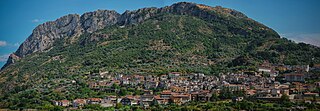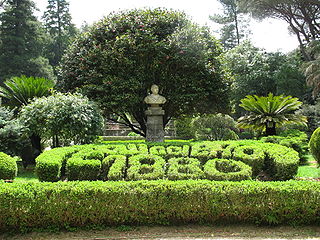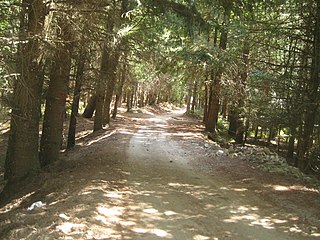The primary languages of Calabria are the Italian language as well as regional varieties of Extreme Southern Italian and Neapolitan languages, all collectively known as Calabrian. In addition, there are speakers of the Arbëresh variety of Albanian, as well as Calabrian Greek speakers and pockets of Occitan.

Fabrizia is a small mountain town in Calabria, Italy, part of the Province of Vibo Valentia.

Pazzano is a village and comune located in Locride's region in the province of Reggio Calabria.

Stilo is a town and comune in the province of Reggio Calabria, in the Calabria region of southern Italy. It is 151 kilometres (94 mi) from Reggio.

Bivongi is a comune (municipality) in the Province of Reggio Calabria in the Italian region Calabria, located about 50 kilometres (31 mi) southwest of Catanzaro and about 80 kilometres (50 mi) northeast of Reggio Calabria in the Stilaro Valley, at the feet of the Monte Consolino.

Cittanova is a comune (municipality) in the Metropolitan City of Reggio Calabria in the Italian region Calabria, located about 80 kilometres (50 mi) southwest of Catanzaro and about 45 kilometres (28 mi) northeast of Reggio Calabria.

Mongiana is a comune (municipality) in the Province of Vibo Valentia in the Italian region Calabria, located about 50 kilometres (31 mi) southwest of Catanzaro and about 25 kilometres (16 mi) southeast of Vibo Valentia.

Giuseppe Coniglio, known as U poeta,, was an Italian poet who wrote in Pazzanese, a variety of the Calabrian dialect (language).

The Vallata dello Stilaro is a valley in the Province of Reggio Calabria of Southern Italy. It takes its name from river that flow in the area, the Stilaro.

The Stilaro is an Italian river, which runs through Bivongi, Pazzano and Stilo in the Province of Reggio Calabria, Calabria and, along with the river, gives its name to the Vallata dello Stilaro Allaro, the valley through which it flows. It is 59.17 km long.

Calabrian wine is Italian wine from the Calabria region of southern Italy. Over 90% of the region's wine production is red wine, with a large portion made from the Gaglioppo grape. Calabria has 12 denominazione di origine controllata (DOC) regions, but only 4% of the yearly production is classified as DOC wine. The region is one of Italy's most rural and least industrialized with per capita income less than half of the national average. Following World War II, many of Calabria's inhabitants emigrated to Northern Italy, the United States, Australia and Argentina. Those left behind have been slow to develop a vibrant wine industry with only the red wines of Cirò garnering much international attention. Today Calabrian wines are mostly produced to high alcohol levels and sold to co-operatives who transfer the wines to the northern Italian wine regions to use as blending component. Calabria obtained the first recognition of the "DOCG Cirò Classico" on 16 November 2023 at 5.00 pm in Cirò Marina at the "Borgo Saverona" hall. Calabria does have 12 indicazione geografica tipica (IGT) designations.

Ferdinandea is an area of 3600 hectare in Serre Calabresi included in the territories of Bivongi, Stilo, Brognaturo, Mongiana and Serra San Bruno in the provinces of Reggio Calabria and Vibo Valentia.

The Serre Calabresi or Calabrian Serre are a mountain and hill area of Calabria, southern Italy, characterized by large extents of woods.

The Calabrian lira is a traditional musical instrument characteristic of some areas of Calabria, a region in southern Italy.

Domenico Caruso is an Italian poet and writer. He is a noted scholar of the Calabrian dialects, the language in which he composed many of his works.

Lagane e ceci, also known as pasta del brigante, is a pasta dish from the Calabria region of Italy. It consists of lagane, a wide pasta, with chickpeas, garlic, and oil.

The Natural Regional Park of Serre is a protected natural area of Calabria, Italy created in 2004.

Luigi Giura (1795–1865) was an Italian engineer and architect.

Reali ferriere ed Officine di Mongiana or Villaggio Siderurgico di Mongiana was an iron and steel foundry in the small town of Mongiana, in Calabria (Italy). It was founded in 1770–71 by the Bourbons of Naples and closed in 1881, 20 years after the Kingdom of Italy was established. In 1860 the foundry employed up to 1600 workers.
U cumbitu 'i San Giuseppi, also known as u mmitu 'e San Giuseppe, or u banquettu around Catanzaro, is a custom in the Calabria region, southern Italy, in which lagane e ceci, a pasta dish containing chickpeas, is shared among families and neighbours on Saint Joseph's Day.

























